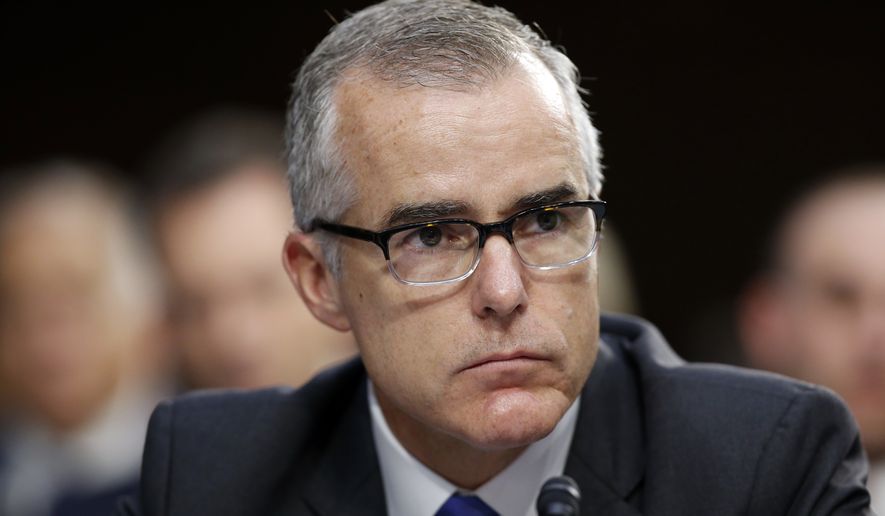The Justice Department inspector general has referred former FBI Deputy Director Andrew McCabe’s case to federal prosecutors to decide whether to bring a criminal case against him, his attorney said Thursday.
The decision represents serious legal trouble for Mr. McCabe and could pit him directly against his former boss, then-FBI Director James B. Comey, who says he is the man who initiated the inspector general’s investigation that has landed Mr. McCabe in hot water.
President Trump gloated over the news, saying it was “a disaster for both of them.”
Republicans on Capitol Hill said the referral was the right decision and that Mr. McCabe’s behavior during the 2016 presidential campaign raises a number of questions.
But the former FBI bigwig’s attorney said the referral, made weeks ago but first reported by The Washington Post on Thursday, was unjustified.
The referral was revealed less than a week after the release of an inspector general’s report finding Mr. McCabe lied repeatedly about a leak he made to The Wall Street Journal in August 2016. The leak confirmed that the FBI was investigating the Clinton Foundation.
Asked about the leak later, Mr. McCabe misled Mr. Comey, then lied under oath to FBI agents and to inspector general officials who were conducting their own investigations into the leak, the inspector general said.
Those findings led Attorney General Jeff Sessions to fire Mr. McCabe this year, just days before he was due to retire.
But the inspector general also concluded that the “lack of candor” might be serious enough to warrant criminal charges. He sent the matter to the U.S. attorney’s office in Washington.
A spokesman for that office referred inquiries to the main Justice Department, which referred them to the inspector general, who declined to comment.
Mr. McCabe’s attorney, Michael R. Bromwich, downplayed any legal danger.
“We were advised of the referral within the past few weeks. Although we believe the referral is unjustified, the standard for an IG referral is very low,” said Mr. Bromwich, who was a Justice Department inspector general in the 1990s.
“We have already met with staff members from the U.S. attorney’s office. We are confident that, unless there is inappropriate pressure from high levels of the administration, the U.S. attorney’s office will conclude that it should decline to prosecute,” Mr. Bromwich said.
Republicans on Capitol Hill cheered the news.
“Andrew McCabe lied to his FBI superiors not once. Not twice. Not three times. He lied four times — multiple times under oath,” said Rep. Mark Meadows, North Carolina Republican. “It’s about time we have some accountability for this type of conduct at the Justice Department.”
A former Justice Department official said a criminal prosecution of Mr. McCabe could put Mr. Comey “in a box” as a possible witness in the case.
“Either McCabe lied or Comey lied,” the source said.
Mr. Comey revealed this week that he was the one who asked the inspector general to investigate the leaks.
Asked Thursday whether he could end up being a witness, Mr. Comey said, “Potentially.”
“Sure, given that the IG’s report reflects interactions that Andy McCabe had with me and other senior executives, I could well be a witness,” Mr. Comey said on CNN’s “The Lead.”
Mr. Trump took to Twitter on Thursday evening to enjoy the troubles both men appear to be facing.
“James Comey just threw Andrew McCabe ’under the bus.’ Inspector General’s Report on McCabe is a disaster for both of them! Getting a little (lot) of their own medicine?” he said.
A day before the news of the referral, a group of conservative Republicans in Congress sent a letter asking Mr. Sessions to initiate a criminal case against Mr. McCabe, Mr. Comey and a number of other Justice Department and FBI officials for behavior surrounding the 2016 presidential campaign.
The Transparency Project, which seeks to hold lawyers accountable, filed a bar grievance in Pennsylvania asking that Mr. McCabe be permanently prohibited from renewing his law license.
• Jeff Mordock contributed to this article.
• Dave Boyer can be reached at dboyer@washingtontimes.com.
• Stephen Dinan can be reached at sdinan@washingtontimes.com.




Please read our comment policy before commenting.